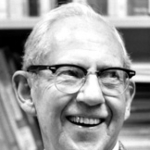Background
BLAUG, Mark was born in 1927 in Den Haag, The Netherlands.

BLAUG, Mark was born in 1927 in Den Haag, The Netherlands.
Bachelor of Arts Queen’s College, New York, 1950. Master of Arts, Doctor of Philosophy Columbia University, 1952, 1955.
Besides shorter periods in public service and in international organisations Blaug has held academic appointments in – among others – Yale University, the University of London, the London School of Economics and the University of Buckingham. He was visiting Professor in the Netherlands, University of Amsterdam and Erasmus University in Rotterdam, where he was also co-director of CHIMES (Center for History in Management and Economics).
Mark Blaug made far reaching contributions to a range of topics in economic thought throughout his career. Apart from valuable contributions to the economics of art and the economics of education, he is best known for his work in history of economic thought and the methodology of economics. Concerning methodological issues and the application of economic theory to a wide range of subjects from education to human capital, the "philosophy of science and the sweep of intellectual progress are fitting subjects to accommodate the breadth of Mark Blaug's interest."
(The main aim of the present volume is to assess the respo...)
(This is a history of economic thought from Adam Smith to ...)
(These vignettes offer an account of each of a range of ec...)
(This is a revised edition of this classic text on the his...)
(Book by Blaug, Mark)
(Book by Blaug, Mark)
(Economics)
Early work was concentrated on British economic history, including a revisionist interpretation of the Old Poor Laws and the history of economic thought, particularly the classical era dominated by Ricardo. My advanced text, Economic Theory in Retrospect, however, covers the entire period from Adam Smith to Milton Friedman. It was an attempt to write a purely analytical history of economics as a story of steady, cumulative progress.
In the 1960s, my interests shifted to the economics of education and for some years I worked in the tradition of human capital theory. For many years I was alone in attacking the manpower forecasting approach to educational planning, which was then very much in vogue. Subsequently, I moved away from human capital theory towards other ways of thinking about the economic value of education.
Alternative methods of financing education (vouchers, loans, full-cost fees) have long been a principal focus of interest. Much of my work in the economics of education in the 1970s has taken the form of international missions to Third World countries. Have also studied public subsidies to the performing arts in Britain.
More recently, have returned to a lifelong concern with the methodology of economics and the appraisal of competing research programmes in economics.
Fellow British Academy; Economic Association
Royal Economic Society
Royal Netherlands Academy Arts and Scis.

